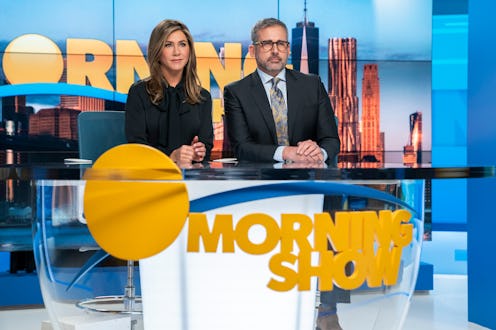
Across its first four episodes, The Morning Show has featured four office romances that span the continuum of power inequity. The most consequential is the affair between married news anchor Mitch Kessler (Steve Carrell) and Ashley, the sound tech who wired his mic under his shirt five times a week. Her accusations of sexual misconduct are the series' inciting event — the keyhole through which we enter this paradoxically insular world of live television. Yet amid the jockeying and infighting that propel the workplace drama, The Morning Show is emerging as a surprisingly nuanced, if occasionally unclear, look at sexual harassment.
In the Nov. 8 episode, The Morning Show's cast and crew meet Vicki, a private investigator hired by the network to assess "the culture that allowed Mitch Kessler's inappropriate behavior to go unchecked." Her study is presented as something benign — a culture survey, conducted through extensive interviews, to help ensure that what happened won't happen again. But on phone calls with the network president, Vicki’s work seems more like a snooping exercise designed to assess the company's level of vulnerability. It's a commentary on the corporate response to allegations of misconduct, which can be swift and correct while still self-serving. Firing Mitch was a robust stand against sexual harassment and a way to protect the network's bottom line from advertisers pulling their spots. Sending in Vicki to kick the tires gives everyone the feeling that the business is doing the right thing, and eases the C-suite's liability fears.
Closer to set, Vicki's arrival sends immediate ripples into the romantic relationship between on-air weather man Yanko Flores and Claire Conway, a much younger production assistant. Unnerved by Vicki’s questions, he asks Claire, essentially, if he's a Mitch. Claire scoffs. "You think because you're older than me and technically my superior at work I can't have decided to f*ck you without being taken advantage of? Just because you're the big powerful weather man, I lose all agency in my sexual choices?" But her denial remains undercut by the fact they've decided to keep their relationship a secret. When Vicki directly asks Yanko if he knows about any sexual misconduct, he says no. The show never clarifies if he's lying or if Yanko doesn't believe that his relationship with a subordinate rises to the level of misconduct. Ashley says that Mitch "never forced me ever. But I guess I still just didn't know how not to go through with it." Yanko didn't force Claire either.
But the relationships do feel different. On The Morning Show, consent is presented as a continuum. It can also be, as we see in Mia's interview, difficult to pin down. Mia used to be Mitch's producer on the show. She was also, for a year of their lives, his lover. Compared to the May-December romances on set, Mia and Mitch were more similar in age and status — though strikingly far from equal. Still, Mia broke up with Mitch, telling Vicki "it got too complicated," whereas Ashley felt she had to quit her job to escape. That said, Mia still doesn't explain their romance as a love story. When Vicki directly asks if Mitch seduced her, the producer is coy. "It did not feel that way at the time." The two were close; Mitch helped Mia feel "seen" and "respected." The suggestion is that when a relationship — even a consensual, respecting one — blossoms against a backdrop of power inequality, that inequality can come to color a person's feelings about it. Mia's "it did not feel that way at the time" sounds a lot like "maybe I just didn't realize what was happening."
At the end of the episode, Mitch's replacement, Bradley, interviews Ashley about his misconduct on live TV. Ashley explains that the breakdown of professional boundaries was attritional; there was flirting and teasing. It was all so arguably, plausibly innocent — except its effect on Ashley was staggering. "I couldn't focus on my job, all I could think about what was what sexual innuendo Mitch would throw my way." If the Claire/Yanko and Mia/Mitch relationships are mired in gray, the relationship with Ashley is what it looks like to cross the pitch-black line. "I felt like my entire career was in the hands of this one person," she confesses on the verge of tears.
But The Morning Show doesn't seem ready to let Mitch go down as a truly bad person — just an ambiguously bad one. His brief romantic relationship with co-anchor Alex (Jennifer Aniston) serves little purpose so far except to rescue Mitch from the accusation that he only pursued those he perceived as weaker. With Alex, ostensibly, no power is lost or exchanged. When it comes to office romance, Mitch is an equal opportunity offender.
The condition that fuses all of these affairs is secrecy, which means we see the relationships — with the exception of Mitch/Ashley — exclusively from the viewpoints of those inside them. In a vacuum, it's unclear if Yanko and Claire represent a paradigm of how to consciously couple up across the lines of power, or a cautionary tale in which they are too enamored to see the inevitable pitfalls ("It did not feel that way at the time").
If Alex's fling with Mitch becomes known, will she be cast as another victim of a sexual pariah, or acquiescent to a culture of secrecy? So far, the show has offered little by way of a prism for how to read these fraught relationships — just a grim sense that they can't end well. What's notable, though, is that The Morning Show insistently pushes the conversation past the obvious misconduct and into those places where lines are as hard for the audience to draw as they can be for the characters to see.